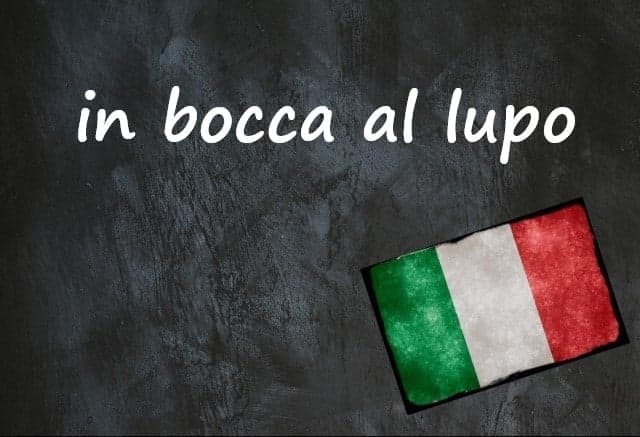
Italian expression of the day: 'In bocca al lupo'

Why wish someone 'good luck' when you can use this Italian phrase instead?
Literally translating into English as 'in the wolf's mouth', this famous Italian phrase is much more interesting to say than a simple 'good luck'.
And in some parts of Italy, saying buona fortuna ('good luck') is sometimes believed to bring the opposite.
That's why, though it may sound a bit dramatic, this idiomatic phrase really is used in everyday conversation in Italy.
Much like the English 'break a leg', the phrase is heard a lot in the theatre. But it's also used when wishing good fortune to someone about to take on a daunting or challenging task - such as sitting an Italian language exam, or visiting the local prefettura.
READ ALSO: Popes, chickens and reheated soup: 15 everyday Italian idioms you need to know
Confusion arises however over what exactly you're supposed to say in response.
If someone says this phrase to you, the correct response is widely believed to be crepi il lupo (may the wolf die), or simply crepi.
Many people consider a simpe grazie or thank you as likely to reverse any good fortune.
However, in reality, the response may vary depending on where you are and who you're talking to.
Wolf-related phases rarely have positive connotations in any language (see also 'keeping the wolf from the door' in English) and Italian is no exception. The phrase andare nella bocca del lupo, or 'to go into the wolf's mouth' means metaphorically 'to get into trouble'.
But some people tend to respond with a grazie anyway - as not everyone in Italy considers being 'in the mouth of the wolf' such a bad thing.
Some even believe the idea of ending up in a wolf's mouth has positive connotations, since wolves protect their young by carrying them in their mouths. After all, the legend of Romulus and Remus tells us the founders of the ancient city of Rome were saved as babies by a she-wolf.
This might explain another, even more unusual response: evviva il lupo (long live the wolf)!
In general though, the easiest response to in bocca al lupo is always crepi. This is especially true for non-native Italian speakers, since if you say anything else you're likely to have a well-meaning Italian presume ignorance and attempt to educate you.
If you really want to avoid all this talk of wolves altogether, there's another, somewhat less refined way of wishing someone good luck: In culo alla balena, which literally means 'in the whale's ass'.
And that one really does defy explanation.
Do you have a favourite Italian word, phrase or expression you'd like us to feature? If so, please email us with your suggestion.
Comments
See Also
Literally translating into English as 'in the wolf's mouth', this famous Italian phrase is much more interesting to say than a simple 'good luck'.
And in some parts of Italy, saying buona fortuna ('good luck') is sometimes believed to bring the opposite.
That's why, though it may sound a bit dramatic, this idiomatic phrase really is used in everyday conversation in Italy.
Much like the English 'break a leg', the phrase is heard a lot in the theatre. But it's also used when wishing good fortune to someone about to take on a daunting or challenging task - such as sitting an Italian language exam, or visiting the local prefettura.
READ ALSO: Popes, chickens and reheated soup: 15 everyday Italian idioms you need to know
Confusion arises however over what exactly you're supposed to say in response.
Join the conversation in our comments section below. Share your own views and experience and if you have a question or suggestion for our journalists then email us at [email protected].
Please keep comments civil, constructive and on topic – and make sure to read our terms of use before getting involved.
Please log in here to leave a comment.